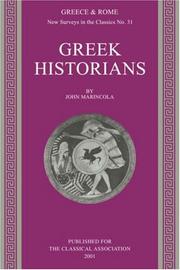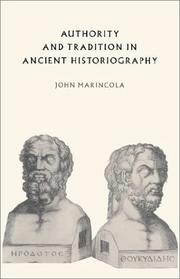| Listing 1 - 10 of 22 | << page >> |
Sort by
|
Book
ISBN: 9781405102162 1405102160 Year: 2007 Volume: *8 Publisher: Oxford : Blackwell,
Abstract | Keywords | Export | Availability | Bookmark
 Loading...
Loading...Choose an application
- Reference Manager
- EndNote
- RefWorks (Direct export to RefWorks)
This two-volume Companion to Greek and Roman Historiography reflects the new directions and interpretations that have arisen in the field of ancient historiography in the past few decades. Comprises a series of cutting edge articles written by recognised scholars Presents broad, chronological treatments of important issues in the writing of history and antiquity These are complemented by chapters on individual genres and sub-genres from the fifth century B.C.E. to the fourth century C.E. Provides a series of interpretative readings on the individual historians Contains essays on the neighbouring genres of tragedy, biography, and epic, among others, and their relationship to history
Greece --- Rome --- Grèce --- Historiography. --- Historiographie --- Historiography --- 931 --- 938.0072 --- Oude geschiedenis--in het algemeen --- History Ancient world Greece Historial research --- 931 Oude geschiedenis--in het algemeen --- Grèce --- Greece - Historiography --- Rome - Historiography
Book
ISBN: 9780199233496 0199233497 9780199233502 0199233500 Year: 2011 Volume: *8 Publisher: Oxford : Oxford University Press,
Abstract | Keywords | Export | Availability | Bookmark
 Loading...
Loading...Choose an application
- Reference Manager
- EndNote
- RefWorks (Direct export to RefWorks)
"Over the past thirty years the study of classical historiography has undergone great changes. While not abandoning traditional questions about sources and reliability, newer scholarship, influenced and informed by the current debates in the academy at large about the nature and purpose of all historiography, has sought to understand the ancient historians on their own terms and has more closely engaged with the ways in which the Greeks and Romans constructed their pasts, with the various roles that history played in these societies, with the relationship of history as a literary composition to other genres, and with the importance of the historian himself in giving form and meaning to his history. The essays in the present volume, six of which are translated into English for the first time, address these and other issues. Topics treated include the relationship of history and myth, the importance of oral tradition in the formation of both Greek andRoman historical traditions, the role of memory (both individual and societal) in shaping notions of the past and determining what is thought worthy of record, the influence of other genres such as poetry and oratory on historiography, and ancient notions of falsehood and historical truth. An introduction places the essays in the larger context of earlier and more recent trends in the study of Greek and Roman historiography"--Publisher's description, p. [4] of cover.
Greece --- Rome --- Historiography.

ISBN: 019922501X 9780199225019 Year: 2001 Volume: 31 Publisher: Oxford Oxford university press
Abstract | Keywords | Export | Availability | Bookmark
 Loading...
Loading...Choose an application
- Reference Manager
- EndNote
- RefWorks (Direct export to RefWorks)
Historiography --- Historians --- Historiographie --- Historiens --- Greece --- Grèce --- History --- Historiography. --- Histoire --- History, Ancient. --- History. --- Grèce --- Historiography - Greece - History. --- Historiens grecs

ISBN: 0521480191 0521545781 0511092784 0511584830 0511002297 9780511002298 9780521480192 9780511584831 9780521545785 Year: 2004 Publisher: Cambridge Cambridge University Press
Abstract | Keywords | Export | Availability | Bookmark
 Loading...
Loading...Choose an application
- Reference Manager
- EndNote
- RefWorks (Direct export to RefWorks)
This book is a study of the various claims to authority made by the ancient Greek and Roman historians throughout their histories and is the first to examine all aspects of the historian's self-presentation. It shows how each historian claimed veracity by imitating, modifying, and manipulating the traditions established by his predecessors. Beginning with a discussion of the tension between individuality and imitation, it then categorises and analyses the recurring style used to establish the historian's authority: how he came to write history; the qualifications he brought to the task; the inquiries and efforts he made in his research; and his claims to possess a reliable character. By detailing how each historian used the tradition to claim and maintain his own authority, the book contributes to a better understanding of the complex nature of ancient historiography.
History, Ancient --- Historiography. --- Histoire ancienne --- Historiography --- Historiographie --- -Ancient history --- Ancient world history --- History [Ancient ] --- Arts and Humanities --- History --- History, Ancient - Historiography.
Book
ISBN: 0141393572 9780141393575 Year: 2017 Publisher: London Penguin Random House UK
Abstract | Keywords | Export | Availability | Bookmark
 Loading...
Loading...Choose an application
- Reference Manager
- EndNote
- RefWorks (Direct export to RefWorks)
Historiography. --- History, Ancient --- Greece --- Greece. --- Rome (Empire). --- Rome --- Historiography
Book
ISBN: 9781444339239 Year: 2011 Publisher: Chichester Wiley-Blackwell
Abstract | Keywords | Export | Availability | Bookmark
 Loading...
Loading...Choose an application
- Reference Manager
- EndNote
- RefWorks (Direct export to RefWorks)
Book
ISBN: 9780521830010 9780521536837 0521536839 052183001X 1139001043 1139817132 9781139001045 Year: 2006 Publisher: Cambridge Cambridge University Press
Abstract | Keywords | Export | Availability | Bookmark
 Loading...
Loading...Choose an application
- Reference Manager
- EndNote
- RefWorks (Direct export to RefWorks)
Herodotus' Histories is the first major surviving prose work from antiquity. Its range of interests is immense, covering the whole of the known world and much beyond, and it culminates in a detailed account of the Persian Wars of the early fifth century BC. Moreover, research has shown that Herodotus is a sophisticated and at times even ironic narrator, and a pioneer and serious practitioner of historical research at a time when the Greeks' traditions about their past were still the fluid transmissions and memories of a largely oral society. This Companion provides a series of accessible chapters, written by distinguished scholars, illuminating many aspects of Herodotus' work: his skill in language and his narrative art; his intellectual preconceptions; his working methods and techniques; his attitude towards nature and the gods; his attitude towards foreign cultures and peoples; and his view of human life and human history.
Herodotus --- Herodot --- Hérodote --- Herodotos --- Criticism and interpretation. --- Criticism and interpretation --- Herodotus van Halicarnassus --- Languages & Literatures --- Greek & Latin Languages & Literatures --- Gerodot --- Hērodotos --- Erodoto --- Hérodote --- Heródoto --- הירודוטוס --- הרודוט --- הרודוטוס --- هردوت --- هيرودوت --- Ἡρόδοτος --- Hérodote (0484?-0420? av. J.-C.) --- Critique et interprétation
Book
Abstract | Keywords | Export | Availability | Bookmark
 Loading...
Loading...Choose an application
- Reference Manager
- EndNote
- RefWorks (Direct export to RefWorks)
J. L. Moles (1949-2015) made fundamental contributions to the fields of ancient (especially Cynic) philosophy, Greek and Roman historiography and biography, Latin poetry, and New Testament studies. These two volumes gather together all of his major articles and reviews, along with six previously unpublished papers. The papers display Moles' individual and sometimes iconoclastic approach, his impressive range in both Classical and New Testament texts, and his unrivalled abilities in close reading. This is volume 1.
Latin poetry. --- Greece --- Historiography.
Book
Abstract | Keywords | Export | Availability | Bookmark
 Loading...
Loading...Choose an application
- Reference Manager
- EndNote
- RefWorks (Direct export to RefWorks)
J. L. Moles (1949-2015) made fundamental contributions to the fields of ancient (especially Cynic) philosophy, Greek and Roman historiography and biography, Latin poetry, and New Testament studies. These two volumes gather together all of his major articles and reviews, along with six previously unpublished papers. The papers display Moles' individual and sometimes iconoclastic approach, his impressive range in both Classical and New Testament texts, and his unrivalled abilities in close reading. This is volume 2.
Latin poetry. --- Greece --- Historiography.
Book
ISBN: 3110672855 3110672820 Year: 2019 Publisher: Berlin ; Boston : De Gruyter,
Abstract | Keywords | Export | Availability | Bookmark
 Loading...
Loading...Choose an application
- Reference Manager
- EndNote
- RefWorks (Direct export to RefWorks)
Building upon the explosion of recent work on mythography, contributions to this volume direct attention to less frequently explored questions of how ancient poets, historians, and philosophers themselves adopted and adapted the work of mythographers. Study of the way that mythographers and their contemporaries take on positions of, alternately, "host" or "parasite" in relation to the other exposes the richness mythographic practice and the roles that mythographers played in the evolving Greco-Roman discourse of myth. From, among others, the seeds of mythographic discourse in Pindar and Plato, to the mythography of the Peripatics, the in-between mythography of Diodorus Siculus, and the "mythographic topography" of Pausanias, this volume invites a reappraisal of the role that mythography played at every stage of Greek thought about myth. Through contributions that explore both mythographers' distinctive style of studying myth to other contributions that focus primarily on the how and why of non-mythographers' use of mythographic techniques, what emerges is a picture of mythography that broadens our conception of mythography while at the same time inviting scholars to seek out more such echoes of mythographic discourse in the work of poets, historians, philosophers at large.
Mythology, Greek. --- Mythology, Classical, in literature. --- Greek. --- Latin. --- myth. --- mythography.
| Listing 1 - 10 of 22 | << page >> |
Sort by
|

 Search
Search Feedback
Feedback About UniCat
About UniCat  Help
Help News
News